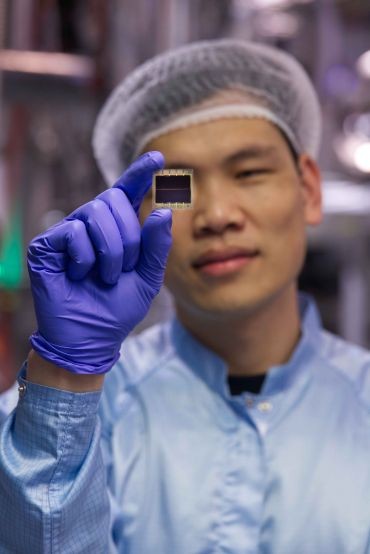
Scientists at Oxford College are coating a brand new photo voltaic power-generating materials onto objects resembling rucksacks, vehicles, and cell phones.
The potential of this breakthrough signifies that growing quantities of photo voltaic electrical energy may very well be generated with out silicon-based photo voltaic panels.

The Oxford scientists’ new light-absorbing materials is, for the primary time, skinny and versatile sufficient to use to the floor of virtually any constructing or frequent object. By stacking a number of light-absorbing layers into one photo voltaic cell (generally known as a multi-junction strategy), a wider vary of the sunshine spectrum is harnessed, permitting extra energy to be generated from the identical quantity of daylight.
This thin-film perovskite materials has been independently licensed by Japan’s Nationwide Institute of Superior Industrial Science and Know-how (AIST) to ship over 27% power effectivity. It matches the efficiency of conventional, single-layer silicon PV for the primary time.
Dr Shuaifeng Hu (pictured), postdoctoral fellow at Oxford College Physics, mentioned:
Throughout simply 5 years of experimenting with our stacking or multi-junction strategy, we have now raised energy conversion effectivity from round 6% to over 27%, near the bounds of what single-layer photovoltaics can obtain at this time.
We imagine that, over time, this strategy might allow the photovoltaic units to attain far larger efficiencies, exceeding 45%.
The flexibility of the brand new ultra-thin and versatile materials can be key – at simply over one micron thick, it’s virtually 150 instances thinner than a silicon wafer. Present photovoltaics are usually utilized to silicon panels, however this may be utilized to virtually any floor.
Dr Junke Wang, Marie Skłodowska Curie Actions postdoc fellow at Oxford College Physics, mentioned:
We will envisage perovskite coatings being utilized to broader sorts of surfaces to generate low-cost solar energy, such because the roofs of vehicles and buildings and even the backs of cell phones. If extra photo voltaic power could be generated on this means, we are able to foresee much less want in the long term to make use of silicon panels or construct increasingly more photo voltaic farms.
The 40 scientists engaged on photovoltaics at Oxford College Physics Division are led by Professor of Renewable Power Henry Snaith. Their pioneering work in photovoltaics and particularly the usage of thin-film perovskite started round a decade in the past.
Oxford PV, a UK firm spun out of Oxford College Physics in 2010 by Snaith to commercialize perovskite photovoltaics, not too long ago began large-scale manufacturing of perovskite photovoltaics at its manufacturing facility in Brandenburg-an-der-Havel, close to Berlin, Germany. It’s the world’s first quantity manufacturing line for “perovskite-on-silicon” tandem photo voltaic cells.
Learn extra: Oxford units a brand new world document for photo voltaic panel effectivity
To restrict energy outages and make your property extra resilient, contemplate going photo voltaic with a battery storage system. In an effort to discover a trusted, dependable photo voltaic installer close to you that provides aggressive pricing, try EnergySage, a free service that makes it simple so that you can go photo voltaic. They’ve a whole lot of pre-vetted photo voltaic installers competing for your online business, making certain you get high-quality options and save 20-30% in comparison with going it alone. Plus, it’s free to make use of and also you received’t get gross sales calls till you choose an installer and also you share your telephone quantity with them.
Your personalised photo voltaic quotes are simple to match on-line and also you’ll get entry to unbiased Power Advisers that can assist you each step of the best way. Get began right here. –trusted affiliate hyperlink*
FTC: We use revenue incomes auto affiliate hyperlinks. Extra.


